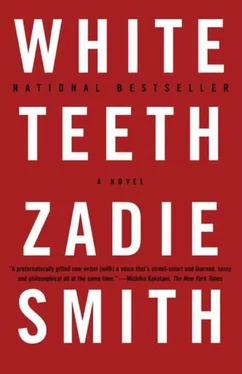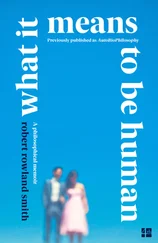‘I mean, they talk about progress,’ said the girl shrilly, becoming somewhat excited. ‘They talk about leaps and bounds in the field of medicine yada yada yada, but bottom line, if somebody knows how to eliminate “undesirable” qualities in people, do you think some government’s not going to do it? I mean, what’s undesirable? There’s just something a little fascist about the whole deal… I guess it’s a good book, but at points you do think: where are we going here? Millions of blonds with blue eyes? Mail order babies? I mean, if you’re Indian like me you’ve got something to worry about, yeah? And then they’re planting cancers in poor creatures; like, who are you to mess with the make-up of a mouse? Actually creating an animal just so it can die – it’s like being God! I mean personally I’m a Hindu, yeah? I’m not religious or nothing, but you know, I believe in the sanctity of life, yeah? And these people, like, program the mouse, plot its every move, yeah, when it’s going to have kids, when it’s going to die. It’s just unnatural .’
Marcus nodded and tried to disguise his exhaustion. It was exhausting just to listen to her. Nowhere in the book did Marcus even touch upon human eugenics – it wasn’t his field, and he had no particular interest in it. And yet this girl had managed to read a book almost entirely concerned with the more prosaic developments in recombinant DNA – gene therapy, proteins to dissolve blood clots, the cloning of insulin – and emerge from it full of the usual neo-fascist tabloid fantasies – mindless human clones, genetic policing of sexual and racial characteristics, mutated diseases, etc. Only the chapter on his mouse could have prompted such an hysterical reaction. It was to his mouse that the title of the book referred (again, the agent’s idea), and it was his mouse upon which media attention had landed. Marcus saw clearly now what he had previously only suspected, that if it were not for the mouse there would have been little interest in the book at all. No other work he had been involved with seemed to catch the public imagination like his mice. To determine a mouse’s future stirred people up. Precisely because people saw it that way: it wasn’t determining the future of a cancer, or a reproductive cycle, or the capacity to age. It was determining the future of the mouse . People focused on the mouse in a manner that never failed to surprise him. They seemed unable to think of the animal as a site, a biological site for experimentation into heredity, into disease, into mortality. The mouseness of the mouse seemed inescapable. A picture from Marcus’s laboratory of one of his transgenic mice, along with an article about the struggle for a patent, had appeared in The Times . Both he and the paper received a ton of hate-mail from factions as disparate as the Conservative Ladies Association, the Anti-Vivisection lobby, the Nation of Islam, the rector of St Agnes’s Church, Berkshire, and the editorial board of the far-left Schnews . Neena Begum phoned to inform him that he would be reincarnated as a cockroach. Glenard Oak, always acute to a turning media tide, retracted their invitation for Marcus to come to school during National Science week. His own son, his Joshua, still refused to speak to him. The insanity of all of it genuinely shook him. The fear he had unwittingly provoked. And all because the public were three steps ahead of him like Oscar’s robot, they had already played out their endgames, already concluded what the result of his research would be – something he did not presume to imagine! – full of their clones, zombies, designer children, gay genes. Of course, he understood the work he did involved some element of moral luck; so it is for all men of science. You work partly in the dark, uncertain of future ramifications, unsure what blackness your name might yet carry, what bodies will be laid at your door. No one working in a new field, doing truly visionary work, can be certain of getting through his century or the next without blood on his palms. But stop the work? Gag Einstein? Tie Heisenberg’s hands? What can you hope to achieve?
‘But surely,’ Marcus began, more rattled than he expected himself to be, ‘surely that’s rather the point. All animals are in a sense programmed to die. It’s perfectly natural. If it appears random, that’s only because we don’t clearly understand it, you see. We don’t properly understand why some people seem predisposed to cancer. We don’t properly understand why some people die of natural causes at sixty-three and some at ninety-seven. Surely it would be interesting to know a little more about these things. Surely the point of something like an oncomouse is that we’re given the opportunity to see a life and a death stage by stage under the micro-’
‘Yeah, well,’ said the girl, putting the book in her bag. ‘What- ever . I’ve got to get to gate 52. It was nice talking to you. But yeah, you should definitely give it a read. I’m a big fan of Surrey T. Banks… he writes some freaky shit.’
Marcus watched the girl and her bouncing ponytail progress down the wide walkway until she merged with other dark-haired girls and was lost. Instantly, he felt relieved and remembered with pleasure his own appointment with gate 32 and Magid Iqbal, who was a different kettle of fish, or a blacker kettle, or whatever the phrase was. With fifteen minutes to spare, he abandoned his coffee which had gone rapidly from scalding to lukewarm, and began to walk in the direction of the lower 50s. The phrase ‘a meeting of minds’ was running through his head. He knew this was an absurd thing to think of a seventeen-year-old boy, but still he thought it, felt it: a certain elation, maybe equal to the feeling his own mentor experienced when the seventeen-year-old Marcus Chalfen first walked into his poky college office. A certain satisfaction. Marcus was familiar with the mutually beneficial smugness that runs from mentor to protégé and back again (ah, but you are brilliant and deign to spend your time with me! Ah, but I am brilliant and catch your attention above all others!). Still, he indulged himself. And he was glad to be meeting Magid for the first time, alone, though he hoped he was not guilty of planning it that way. It was more a series of fortunate accidents. The Iqbals’ car had broken down, and Marcus’s hatchback was not large. He had persuaded Samad and Alsana that there would not be enough room for Magid’s luggage if they came with him. Millat was in Chester with KEVIN and had been quoted as saying (in language reminiscent of his Mafia video days), ‘I have no brother.’ Irie had an exam in the morning. Joshua refused to get in any car if Marcus was in it; in fact, he generally eschewed cars at present, opting for the environmentally ethical option of two wheels. As far as Josh’s decision went, Marcus felt as he did about all human decisions of this kind. One could neither agree nor disagree with them as ideas . There was no rhyme nor reason for so much of what people did. And in his present estrangement from Joshua he felt more powerless than ever. It hurt him that even his own son was not as Chalfenist as he’d hoped. And over the past few months he had built up great expectations of Magid (and this would explain why his pace quickened, gate 28, gate 29, gate 30); maybe he had begun to hope, begun to believe , that Magid would be a beacon for right-thinking Chalfenism even as it died a death here in the wilderness. They would save each other. This couldn’t be faith could it, Marcus ? He questioned himself directly on this point as he scurried along. For a gate and a half the question unnerved him. Then it passed and the answer was reassuring. Not faith, no, Marcus, not the kind with no eyes. Something stronger, something firmer. Intellectual faith.
Читать дальше












